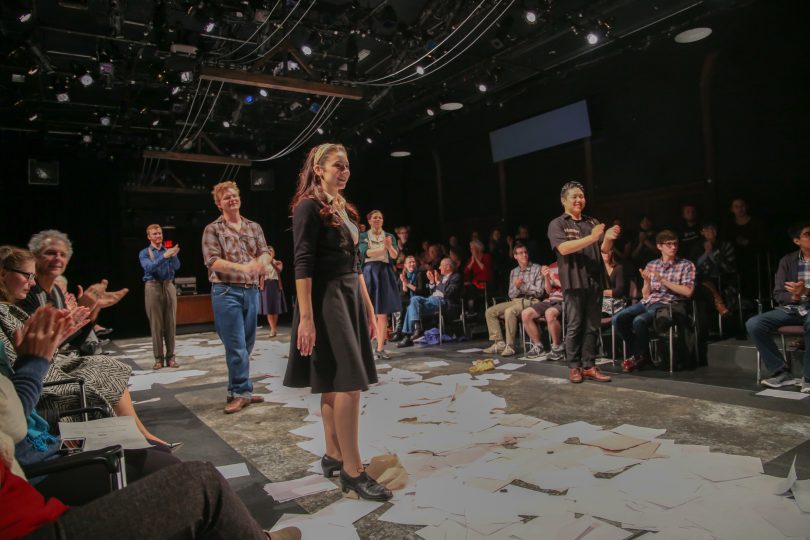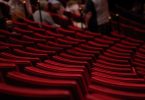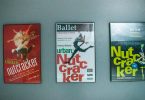By Sana Haque
BU News Service
If poetry can be held timeless, Boston University’s theatrical production of “Hydrogen Jukebox” certainly paid homage to the fact. Developed as a chamber opera between Beat poet Allen Ginsberg and renowned musician Philip Glass in 1988, the show interspersed Glass’s compositions with scatterings of Ginsberg’s poetic works to create a macabre insight into the seedier side of post-modern America. “Hydrogen Jukebox” kick-started the 20th annual BU Fall Fringe Festival 2016 this past Friday, running through Sunday.
The collaborative effort between the BU School of Music and School of Theatre included a six characters and a chamber ensemble to evoke powerful themes that resonate with audiences across generations: the disillusionment with war, drugs, and government corruption intermingled with a call for enlightenment and a return to nature. The savage reception of America’s socio-political atmosphere became a nod not just to the 1950s but also held relevance to current times.
“We found the piece compelling from a musical and dramatic point of view, and most certainly topically appropriate in the current election season,” Managing Director Oshin B. Gregorian said, when asked about the inspiration behind the production.
The packed theatre witnessed the unnamed protagonists, performed by Erik Larson (baritone), Bridget Cappel (mezzo), Heeseung Chae (baritone), Regina Morgan (soprano), Tim McGowan (tenor) and Helen Hassinger (soprano II), use song, movement, lighting, liminal space and minimal props to create a timeless repertoire that aroused all sensation and crafted a haunting message of isolation and loneliness, even as the chorus was united in song and choreography. Touching upon government corruption, the war against drugs, religion, corporate culture, and the matter of and fallout with war itself, the story line weaved in a transient manner and had a dreamlike quality; the movement shifted with the musical intonations, from urgency to boneless suspension. Characters shuffled through a series of individual conflicts with post-modern facets of daily life, concluding with “Father Death Blues” in an enlightened reverence on death and finality to advance toward literal and figurative light.

Helen Hassinger (second from the right), soprano II, answers questions from the audience after the performance. Photo by Silvia Mazzocchin/BU News Service
“Hydrogen Jukebox,” taken from Ginsberg’s seminal work, “Howl,” includes poetic pieces that range from “To P.O” to “N. S. A. Dope Calypso,” to “Nagasaki Days (Everybody’s Fantasy).” These were carefully structured in a subliminal cry to “relieve human suffering by communicating some kind of enlightened awareness of various themes…obsessions, neuroses…perplexities that we encounter as we end the millennium,” according to Ginsberg.
It was captivating to understand how this was physically manifested by the motley collection of professionals and students, both graduates and undergraduates.
“The opera,” Gregorian said, “is epic in its scope…so scenic designer Paul Dufresne arrived at a liminal space that could evolve along with the opera. Keying into the recurrence of traveling imagery, Paul set us on the Kerouacian road. The singers transformed the space through their choreographed physicality and use of props.”
According to Stage Director Emily Ranii, the performance drifted from its origins as movement was used to define the story as an homage to Ginsberg and commentary on the current socio-political climate.
“It was a collaborative process to make the story very approachable and exciting for those who don’t know Glass or Ginsberg,” she explained.
The cast and crew admitted, however, that the three-week performance was a step-by-step process whereby storytelling voices were discovered as an ensemble; their movements were re devised in a back-and-forth development a mere week prior to the opening night.
Audience reviews were generally positive, although some criticized the lack of clarity and approachability. Franchesca Secco, a second-year graduate transfer from Padua University, said “The Q-&-A session after the show was more informative. The show was very visual but its story line wasn’t clear to me.” Tim Burkman, a fourth-year transfer student from Germany working as a Research intern, added, “It was dark and powerful; it was not exactly easy to listen to.”

After the end of the opera, attendees collect paper strewn on the stage during the performance. Photo by Silvia Mazzocchin/BU News Service
Of course, others were more receptive to the poignant operatic experience. Boston College student Emily Larrson, an avid Fringe Festival supporter, said, “Boston University students normally produce very cutting-edge and fresh work that ties well with national concerns. I loved the show; it was a gorgeous production – especially the design and the intimate theatre that allowed for immediate emotional connection.”
But was “Hydrogen Jukebox” at par with the director’s expectations? Gregorian certainly thought so.
“Our students excelled, exceeding our expectations,” he said. “This was one of the most transformational experiences in our performance history, both for the performers and the audience.”




